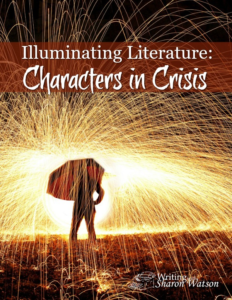

- Illuminating Literature: Characters in Crisis - Student Textbook - 302 page softcover consumable book with 38 lessons for 13 novels, short stories, and an auto/biography.
- Illuminating Literature: Characters in Crisis - Teacher's Guide - 180 page softcover book with grading grids, lesson plans, and so many kinds of teacher helps to introduce you to the works your student will read and help you guide the discussions you can have with your student. I would say that the Teacher's Guide is not optional with this curriculum.
- Illuminating Literature: Characters in Crisis - Quiz and Answer Manual - 62 page softcover consumable book with all "Yes, I Read It" quizzes, literary terms quizzes, and opinion surveys for every piece of literature read during the year. This book is optional! All of these quizzes are available for free online when you purchase the curriculum. Some people just prefer paper and pencil learning. This manual is perfect for those people.
- The Novel Notebook - a free PDF download, the Novel Notebook coordinates with the textbook and is the kind of thing that many of us probably kept in high school. In it, students will note favorite passages, draw conclusions about what they read, and keep track of various other aspects of the course. It is a required element of the course. You can print it and hole punch if for a three-ring binder, or you can take it to an office supply store and have it coil-bound (our preference).
Although you are always free to use any editions of any books, it is highly recommended that you use the editions that Sharon Watson uses, as she will reference specific pages and passages. This shouldn't present any kind of a hardship, as she selects Dover Thrift Editions where possible, and as far as I know, these are the cheapest editions of any books out there.
How We Used It
Although I plan for Michael to do this course, too, it was Mary-Catherine (13) to whom I gave it for review. I need to order another student book before Michael can begin, and his course load is rather full anyway, so it worked out well that Mary-Catherine began it first. The thing that I love most about Writing with Sharon Watson literature is the way she uses an organizing principle to bring order to her literature selections. Because of the organizing principle, it also helps students to be able to read literature more effectively and efficiently in the future. Her last course's theme centered around conflict. This course centers around crisis. Students are taught to identify the crisis in the work of literature and to understand how it shapes everything that happens.
The first piece of literature considered in the course is a short story, "A Jury of Her Peers," that is included in the textbook. It was a good way for Mary-Catherine to get her feet wet with this course. One wonderful thing that Sharon Watson does is establish her "cred" with her audience immediately. In the first lesson, she quotes both Dean Koontz and Orson Scott Card when discussing establishing empathy with the audience. When I teach my own kids, I often bring out Stephen King to illustrate a concept related to characterization or personification, so I appreciate that Sharon Watson doesn't shy away from quoting real authors - that she doesn't believe that a course can't both articulate a Christian worldview and quote secular material. And Mary-Catherine may not have read Koontz and Card, but her older sister has, so she has respect for the names.
Like every work in this course, "A Jury of Her Peers," includes information about the background and setting of the story. The student does lessons before ever reading the story. I actually had to hold Mary-Catherine back from doing more than the lesson plans suggested she do in a week (the suggested pace is roughly four weeks per selection), because I really wanted her to marinate in the material. I was very pleasantly surprised by how well she "got" the point of the story (there is irony in this one...) and by how thoughtful her answers to the questions in the text were!
We have just moved on to Frankenstein, which I am doing as a read aloud for a couple of reasons. First, Michael will eventually be doing the course anyway. Second, as a freshman in high school, Nicholas (14) should be familiar with Frankenstein, too, and I don't know if he will ever end up reading it, so now is as good a time as any.
I hope it's obvious that we really love Writing with Sharon Watson's Illuminating Literature: Characters in Crisis. If you want to see how other Crew Members felt about the program, please, for the last time in 2017, click on the banner below!


Thank you for your review, Laura! I think it is so smart of you to read Frankenstein aloud with your teens. What fun, and what a gift you are giving them. And please say thank you to Mary-Catherine for me for all her work on the review and for loving the course!
ReplyDelete